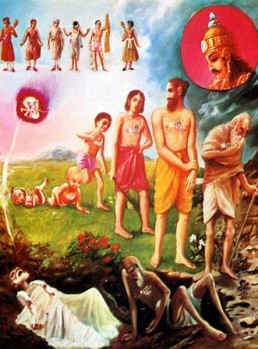Swami Chinmayananda Commentary
He alone — who, with perfect self-control, goes through life among the infinite number of sense-objects, each impinging upon him and trying to bind him with its charm, and approaches them with neither love nor hatred — comes to enjoy PEACE. By running away from the sense-objects, nobody can assure for himself any inner peace; because, the inner disturbance depends not upon the presence or the absence of the sense-objects in the outer-world, but essentially upon the mind’s agitations for procuring the desirable objects, or for getting rid of the undesirable objects.
But a Master-of-Wisdom, with perfect self-control, moves among the objects of the world with neither any special love, nor any particular aversion, for them. Wherever I go, my shadow must play all around me according to the position of the light; but the shadow can neither entangle me with love, nor can destroy me with hatred! The outer-world-of-objects is able to whip that man who lends the power to the objects to smother him!!
Supposing there is a lunatic who is whipping himself and weeping in pain; his sorrows can be ended only when he is persuaded not to take the whip in his hand. He could be advised, even if he kept the whip in his hand, not to swing his arms in the fashion in which he is doing! Similarly, here, the mind woos the objects and gets beaten. It is told, as an advice, that an individual who lives in self-control, will no longer lend his own life’s dynamism to an object to persecute him — through his own sentimental aversion to, or love for, that object.
When the lunatic is taught not to wield the whip and strike himself, he is immediately saved from the sorrows of the whip. Similarly, when a mind is trained in these two aspects: (a) to live in self-control, and (b) to move among the sense-objects, with neither an attachment for, nor an aversion to them, the disturbances and agitations in the mind caused by the sense-enchantments are all immediately brought under control. This condition of the mind is called tranquillity or peace (Prasada).
This is symbolically represented in the sweet-distribution after every Puja in all religions, and is called among the Hindus as Prasada (or Bhog), meaning that, one who has, during the ritual, practised perfect self-control and God-contemplation, comes to enjoy, as a result of his action, a tranquillity in the mind which is termed as Spiritual Grace, or Divine Peace (Ishwara Prasada).
Here, as far as a Vedantin is concerned, Prasada is mental purification. That mind is considered as pure, which feels in itself the least sense-disturbances. One who has learnt to live in self-control and has trained himself to live among the sense-objects in a spirit of the least attachment to, or aversion for them, has the least disturbance, because of the ineffectiveness of the sense-objects upon him. Thereby, his mind automatically becomes more and more calm and tranquil, and is considered as pure (Prasada) for purposes of the spiritual life.
WHAT WILL HAPPEN WHEN PEACE IS ATTAINED? LISTEN:
Adi Sankara Commentary
Certainly the functions of the organs are naturally preceded by attraction and repulsion. This being so, caran, by perceiving; visayan, objects, which are unavoidable; indriyaih, with the organs such as ears etc.; raga-dvesa-viyuktaih, that are free from those attraction and repulsion; and are atma-vasyaih, under his own control; vidheya-atma, [A.G. takes atma-vasyaih in the sense of ‘(with the organs) under the control of the mind’. He then argues that it the mind be not under control, there can be no real control, over the organs. Hence the text uses the second expression, ‘vidheyatma, whose mind can be subdued at will’. Here atma is used in the sense of the mind, according to the Commentator himself.] the self-controlled man, whose mind can be subdued at will, a seeker after Liberation; adhigacchati, attains; prasadam, serenity, self-poise. What happens when there is serenity? This is being answered:
The Bhagavad Gita with the commentary of Sri Sankaracharya – Translated by Alladi Mahadeva Sastry
Holy Geeta – Commentary by Swami Chinmayananda
The Bhagavad Gita by Eknath Easwaran – Best selling translation of the Bhagavad Gita
The Bhagavad Gita – Translation and Commentary by Swami Sivananda
Bhagavad Gita – Translation and Commentary by Bhaktivedanta Swami Prabupadha
Srimad Bhagavad Gita Chapter 2 – Verse 64 – 2.64 raga-dvesha – All Bhagavad Gita (Geeta) Verses in Sanskrit, English, Transliteration, Word Meaning, Translation, Audio, Shankara Bhashya, Adi Sankaracharya Commentary and Links to Videos by Swami Chinmayananda and others – 2-64

